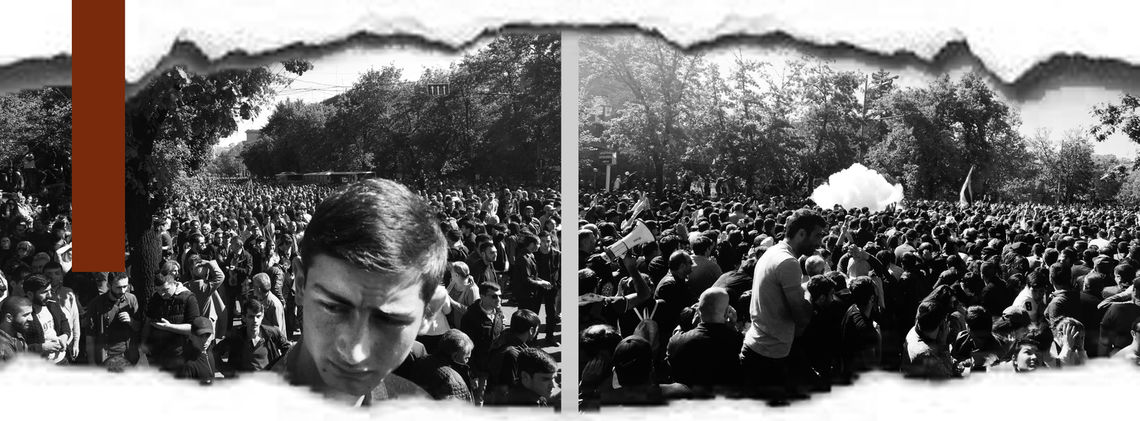
April 16, 2018
I’m sitting at a cafe in downtown Yerevan that we have converted into a makeshift office. It’s a dark, quiet corner. There are camera bags and wires strewn around me. Several water glasses and half-empty cups of cold coffee teeter perilously at the edge of the small, round table. Light is streaming in through the large arched windows. I have one eye outside and the other on the livestream. It’s mid-April, the early days of the Velvet Revolution in Armenia, although at the time, what is happening doesn’t have a name yet.
Thousands of people are gathered at France Square about a 100 meters from where I’m sitting. Baghramyan Avenue, to my left, is blocked by water cannons, armored personnel carriers, riot police and barbed wire. It’s the day that parliament is set to elect the sole candidate as the country’s new prime minister. After completing his second and final term as Armenia’s president, Serzh Sargsyan, who had promised not to seek the office of the prime minister, has been positioned by the ruling coalition as the only viable choice to lead the country. Opposition MP Nikol Pashinyan has been in Yerevan for several days now after a two-week trek through the country to mobilize the population against this pending vote. Several members of our modest “crew” are out on the streets, including my son.
I’m nervous. I always am when there are protests. You would think that after more than a decade of reporting from Armenia, it would get easier. It doesn’t.
My husband arrives. He sits down beside me and orders a coffee. He’s asking questions I don’t have the answers to. I give him one of my earbuds so he can listen to the livestream. Pashinyan has been addressing the crowd in France Square for the past half hour. He’s giving an impassioned speech and the people on the square are listening intently. He announces that the time has come for him to go to parliament to take part in the vote that is expected to take place within the hour. My heart misses a beat. This won’t end well I think. He leads the massive crowd toward Baghramyan Avenue and in a few minutes I no longer have to follow the livestream, I see them walking by the cafe. My son is somewhere in the crowd taking photos and videos. I know he knows how to do this, but my anxiety kicks up another notch. Soon it will have nowhere else to go. When do you stop being a mother?
The crowd is now facing rows and rows of riot police on Baghramyan. My eyes are glued to the computer screen, my face crumpled into what has now become a perpetual frown. The situation is tense although relatively calm. Suddenly, things quickly escalate. There’s shouting, pushing, shoving, things are being thrown. Pashinyan is on someone’s shoulders, trying to jump over the barbed wire.
As I continue to watch the commotion on my computer screen, I am startled by a deafening explosion and then what sounds like an immensely loud hissing noise and then another and another. I look out the window of the cafe and see people running in all directions. I look back at the live feed and think it’s tear gas because there is white smoke everywhere. And I’m screaming inside my head, “Stop, stop, stop!” I am transported back a decade to March 1, 2008, when I was a much younger journalist trying to report and later understand how ten people were killed in severe clashes… “Stop,” I whisper. “For the love of God, please stop.”
I can’t bear to look. I remember my child is out there. I turn to my husband and say, “You go find my son right now.”
I don’t know how the words come out, whether I yell or utter them through clenched teeth, but he immediately gets up and runs out of the cafe and into the crowd. As he disappears into the moving mass, I see people being carried out, most of them bleeding from their feet and legs, others screaming for doctors and ambulances. I grab my phone, leaving behind my computer and purse in the cafe, and run out to film the bloodied and injured being piled into ambulances. My hands are trembling but I know I have to capture these images because the rest of our crew is near the barricade. I run from one ambulance to another, my heart is pounding so hard I think it’s going to break my ribs…
I race back into the cafe to start uploading the footage. I try to call my colleagues, but the lines are jammed. A few minutes later, my husband rushes back in and I give him a quizzical look. “Did you see him?” I ask. He says that he couldn’t find him, but he was able to call and get through. “He told me to stay back because they’re throwing concussion grenades,’” my husband says, choking on his words.
Parliament elects Serzh Sargsyan as Armenia’s prime minister.
April 22, 2018
It’s Sunday morning. Today, Nikol Pashinyan will meet with Prime Minister Serzh Sargsyan at the Marriott Hotel on Republic Square. I have a Skype interview with Al Jazeera at 10 a.m. The international media has been beating down our door, looking for English-language commentary. I’ve decided to do the interview from home while following the events at the hotel and posting to our social media platforms.
The meeting between the opposition leader and the newly elected prime minister collapse. Sargsyan storms out of the meeting and Pashinyan leaves the hotel and starts walking toward the Erebuni district of the city. It seems he has been walking non-stop for days.
In the meantime, Al Jazeera’s producer wants me at the top of every hour. By the time I make it back to the office, Pashinyan and two other members of parliament have been detained, clashes have taken place and there is heavy presence of security forces everywhere and the entire city is extremely tense.
I walk into our office and our managing editor Roubina is sitting at the table with a peculiar grin on her face. She gets up and gives me a tighter-than-usual hug. She’s somewhat pale, but the stress of the last ten days has taken its toll on all of us, so it doesn’t strike me as being out of the ordinary, whatever ordinary is anymore.
I sense something is going on and I give her a questioning look, she smiles, bends down and pulls up the leg of her jeans, and my stomach does a quick turn. She’s been injured.
And then the barrage of questions.
I try to shrug it off and say that she’s earned her stripes as a journalist, and it doesn’t look so bad, but we insist a doctor sees her leg that’s been cut open in three places by shrapnel from a concussion grenade. She says it’s nothing, that her ear is what is bothering her more than her bloodied leg. We bring in a doctor just to make sure. We tell her that she’s off the streets for the rest of the day but after an hour of fidgeting in her chair, she says that she feels useless, grabs her camera bag and is out the door.
April 23, 2018
The flow of events is incredible. We can’t keep up. We have people in as many locations as possible, sending us photos and videos. We’re not sure where Pashinyan is being held or where the other parliamentarians are. There’s conflicting news. We know that university students have been on the move since early morning. We hear that a battalion of soldiers have broken rank and joined the students, but we’re not sure. How is that even possible?
Meanwhile, my son is with me and today, my daughter has joined us as well. I give her admin access to our social media platforms so she can help with the deluge of news that’s no longer flowing, but erupting. At one point during the day, when she has a moment to breathe, she looks up and says, “Mom, is this how you’ve been working? How have you been doing this?”
Then we hear the news that Pashinyan and the other opposition parliamentarians have been released from prison and are making their way to Republic Square. We regroup and try to make sure we have people on the square when he arrives. There’s no strategy at this point, we are making things up as we go. At one point I whip a notebook across the room in frustration.
Conflicting news keeps flowing in. We try to ignore and only post what we can verify. I feel like I’m drowning. Our small office is a mess. There are empty pizza boxes on the floor, camera equipment, wires, bags, laptops scattered everywhere. There’s a strange tension we can't quite identify.
Roubina and I go downstairs, me to get some fresh air and she to continue taking photos. It seems that while I’ve been chained to the computer, she’s been an inseparable part of the movement playing out in the streets and squares of the city.
There are people everywhere. We see some friends and talk about the rumors that have been swirling about Serzh Sargsyan’s possible resignation. I know it’s not possible yet possible is what we’ve been living these last two weeks.
Just as we’re discussing the impossible possibility, a young man runs out of our building and screams, “Sargsyan has resigned!”
There’s a split second of silence. The world stops spinning.
And like a wave, as the news spreads, the sounds of people’s shouts gets louder and louder until nothing in the world matters anymore. I remember holding in a scream and then I’m running through the door, running into the elevator to get to my computer to break the news. I run into the office and see my daughter in front of my computer, with my son standing over her, bent down to see what she’s doing. Their backs are to the door and they don’t see me.
Videos by Roubina Margossian.
I don’t say anything. I just stand there for a second. They intuitively feel my presence and simultaneously turn around, a bright light emanating from their eyes and all of a sudden, they are no longer adults. Before me are my babies, 9 and 12, the ages they were when we moved to Armenia. My sight blurs from the tears that are quickly gathering in my eyes.
“Mama, Serzh resigned!” my daughter exclaims.
“I know baby,” I say.
They run toward me and we fall into each other’s arms. As I hold my children tight to my chest, I know that 17 years of my life in Armenia was meant for this very moment.
I tell them to go outside.
“Go be with the people,” I say.
“Are you sure, mama?” my son asks.
“Yes, hokis, go, go…”



